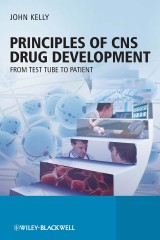Details

Principles of CNS Drug Development
From Test Tube to Clinic and Beyond1. Aufl.
|
125,99 € |
|
| Verlag: | Wiley |
| Format: | |
| Veröffentl.: | 27.10.2009 |
| ISBN/EAN: | 9780470682913 |
| Sprache: | englisch |
| Anzahl Seiten: | 324 |
DRM-geschütztes eBook, Sie benötigen z.B. Adobe Digital Editions und eine Adobe ID zum Lesen.
Beschreibungen
This title acts as a primer, giving students and newcomers to the field an opportunity to learn about the breadth of the CNS drug discovery. The book outlines the core processes in drug discovery and development for CNS disorders, from evaluating drugs for desirable efficacy, safety and pharmacokinetic features in preclinical (using <i>in vitro</i> and <i>in vivo</i> models) and clinical experimentation to identifying future drug targets. Containing up-to-date experimental evidence and detailing the main impediments in the pipeline of CNS drug discovery and development, this is a key reference for those involved in all stages of CNS drug discovery. <p><b>Key Features:</b></p> <ul type="disc"> <li>Discusses in detail the key stages of CNS drug discovery, outlining the particular requirements and obstacles for CNS drugs</li> <li>Addresses safety concerns and future drug targets</li> <li>Provides succinct background information about the major CNS diseases</li> <li>Examples of specific drugs are used throughout to describe the development of a new drug from conception to clinical use and post-market surveillance</li> <li>Primary reasons for drug failure are given for each stage</li> </ul>
<b>Acknowledgements.</b> <p><b>Preface.</b></p> <p><b>Abbreviations.</b></p> <p><b>1 Introduction.</b></p> <p>1.1 The global burden of CNS disease.</p> <p>1.2 Assessment of the global burden of disease.</p> <p>1.3 The prevalence of CNS disorders.</p> <p>1.4 Disability due to CNS disorders.</p> <p>1.5 Economic Costs.</p> <p>1.6 Concluding comments.</p> <p>References.</p> <p><b>2 An overview of the major CNS disorders.</b></p> <p>2.1 Introduction.</p> <p>2.2 Overview of psychiatric disorders.</p> <p>2.3 Overview of neurological/neurodegenerative disorders.</p> <p>2.4 Concluding comments.</p> <p>References.</p> <p><b>3 Neurobiological substrates of CNS disorders.</b></p> <p>3.1 Introduction.</p> <p>3.2 Brief introduction to the principles of chemical neurotransmission.</p> <p>3.3 Stages of chemical neurotransmission.</p> <p>3.4 Approaches to investigating CNS alterations in CNS disorders.</p> <p>3.5 Evidence for a neurobiological rationale for CNS disorders.</p> <p>3.6 Concluding comments.</p> <p>References.</p> <p><b>4 Current pharmacological targets.</b></p> <p>4.1 Introduction.</p> <p>4.2 Pharmacological treatments for depression.</p> <p>4.3 Pharmacological treatments for schizophrenia.</p> <p>4.4 Pharmacological treatments for anxiety disorders.</p> <p>4.5 Pharmacological treatments for epilepsy.</p> <p>4.6 Pharmacological treatments for Parkinson’s disease.</p> <p>4.7 Pharmacological treatments for Alzheimer’s disease.</p> <p>4.8 Concluding comments.</p> <p>References.</p> <p><b>5 Premarketing efficacy evaluation.</b></p> <p>5.1 Introduction.</p> <p>5.2 Target identification.</p> <p>5.3 Lead optimisation.</p> <p>5.4 Target validation in animal models.</p> <p>5.5 The use of genetically modified animals in CNS drug development.</p> <p>5.6 A selection of animal models of psychiatric disease.</p> <p>5.7 A selection of animal models of neurodegenerative disease.</p> <p>5.8 Which models to choose.</p> <p>5.9 Clinical trials that evaluate drug efficacy.</p> <p>5.10 Specific drug profiles.</p> <p>References.</p> <p><b>6 Pharmacokinetic considerations: Absorption, distribution, metabolism and elimination.</b></p> <p>6.1 Introduction.</p> <p>6.2 What are the ‘ideal’ pharmacokinetic properties for a CNS drug?</p> <p>6.3 Absorption.</p> <p>6.4 Distribution.</p> <p>6.5 Metabolism.</p> <p>6.6 Elimination.</p> <p>6.7 Measurement of drug concentrations.</p> <p>6.8 Factors that affect pharmacokinetics.</p> <p>6.9 Allometric scaling.</p> <p>6.10 Microdosing (Phase 0) Studies.</p> <p>6.11 Dose prediction and therapeutic drug monitoring.</p> <p>6.12 Stereoselectivity of metabolism of drugs.</p> <p>6.13 Specific drug profiles.</p> <p>6.14 Concluding comments.</p> <p>References.</p> <p><b>7 Safety concerns.</b></p> <p>7.1 Introduction.</p> <p>7.2 Postmarketing surveillance.</p> <p>7.3 Acute poisoning.</p> <p>7.4 Quantification of the relative risk of fatalities from CNS drugs.</p> <p>7.5 Adverse drug reactions (ADRs).</p> <p>7.6 Specific types of toxicity encountered with psychotropic drugs.</p> <p>7.7 Safety concerns following long-term administration of CNS Drugs.</p> <p>7.8 Polypharmacy.</p> <p>7.9 Specific drug profiles.</p> <p>7.10 Concluding Comments.</p> <p>References.</p> <p>Websites.</p> <p><b>8 Preclinical and clinical safety evaluation.</b></p> <p>8.1 Introduction.</p> <p>8.2 Preclinical exploratory toxicology and safety pharmacology evaluations.</p> <p>8.3 Primary and secondary pharmacology.</p> <p>8.4 Safety pharmacology.</p> <p>8.5 Toxicology studies required for regulatory purposes.</p> <p>8.6 Clinical Studies.</p> <p>8.7 Specific drug profiles.</p> <p>8.8 Concluding comments.</p> <p>References.</p> <p>Websites.</p> <p><b>9 CNS drug targets in development and future perspectives.</b></p> <p>9.1 Introduction.</p> <p>9.2 How much does it cost to develop a drug?</p> <p>9.3 Clinical drug development times.</p> <p>9.4 Harmonisation between regulatory agencies.</p> <p>9.5 Development of biomarkers for clinical efficacy.</p> <p>9.6 Quality of life issues.</p> <p>9.7 Cost-effectiveness of novel treatments.</p> <p>9.8 Patient advocacy groups.</p> <p>9.9 Novel targets for CNS disorders.</p> <p>9.10 Targets in selected CNS disorders.</p> <p>9.11 Targeting of signalling pathways.</p> <p>9.12 Cardiovascular drugs in Alzheimer’s disease.</p> <p>9.13 Modifying oxidative stress and inflammatory responses.</p> <p>9.14 Targeting of the amyloid-ß protein in Alzheimer’s disease.</p> <p>9.15 Concluding comments.</p> <p>References.</p> <p><b>Appendices.</b></p> <p><b>Index.</b></p>
"The data that have been presented in this book are accurate and informative." (<i>Canadian Journal of Neurological Sciences</i>, November 2010)<br /> <br />
<b>Dr. John Kelly</b>, Senior Lecturer, Department of Pharmacology and Therapeutics, NUI, Galway, Ireland.
Central Nervous System (CNS) disorders are responsible for a vast range of illnesses, including depression, schizophrenia, Parkinson’s disease and Alzheimer’s disease. Recent advances in areas such as genome sequencing and molecular biology have improved the potential for breakthrough treatments for these diseases, yet the drug development process for CNS disorders has remained stubbornly slow. <p><i>Principles of CNS Drug Development: From Test Tube to Patient</i> outlines the core processes in drug discovery and development for CNS disorders, from evaluating drugs for desirable efficacy, safety and pharmacokinetic features in preclinical (using <i>in vitro</i> and <i>in vivo</i> models) and clinical experimentation to identifying future drug targets. Containing up-to-date experimental evidence and detailing the main impediments in the pipeline of CNS drug discovery and development, this is a key reference for those involved in all stages of CNS drug discovery.</p> <ul> <li> Provides succinct background information on the major CNS diseases</li> <li> Follows the development of a new drug from conception to clinical use and post-market surveillance using specific examples</li> <li> Outlines the particular requirements and obstacles for CNS drugs</li> <li> Highlights the primary reasons for drug failure at each stage</li> <li> Addresses most likely future drug targets</li> </ul> <p><i>Principles of CNS Drug Development: From Test Tube to Patient</i> will be an invaluable resource for students, researchers and professionals in pharmacology, neuroscience and the pharmaceutical industry.</p>

















